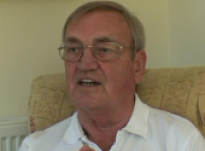Eddie - Interview 21

More about me...
Eddie first noticed a lump on his left breast when he was 12 or 13 years old which he thought was a bit unusual but he didn’t talk to anyone about it at the time. During the 1980s, when he was in his 40s Eddie thought the lump was a bit bigger and he mentioned it to his GP when he was visiting him about something else. His GP sent him for a biopsy which came back clear.
Eddie noticed a lump when he was 12 but didn't mention it to anyone. A biopsy in his 40s proved normal. Twenty years later the lump began to sting and he insisted on another biopsy.
Eddie noticed a lump when he was 12 but didn't mention it to anyone. A biopsy in his 40s proved normal. Twenty years later the lump began to sting and he insisted on another biopsy.
Eddie was in a 'haze', dejected and 'in denial' when he was told he had breast cancer. He didn't know men could get it. A 'stiff upper lip' helped him to cope with his initial emotions.
Eddie was in a 'haze', dejected and 'in denial' when he was told he had breast cancer. He didn't know men could get it. A 'stiff upper lip' helped him to cope with his initial emotions.
But there again of course I had to wait then until the fourteenth of May I think it was for a- for the results to come through. And so I returned to the hospital, saw the same consultant surgeon, and unfortunately it was one of those very strange things. I- you could suggest that she was extremely brutal with me-
Eddie was diagnosed with lymphoedema during a routine visit to his oncologist. He was prescribed antibiotics and referred to the local lymphoedema clinic.
Eddie was diagnosed with lymphoedema during a routine visit to his oncologist. He was prescribed antibiotics and referred to the local lymphoedema clinic.
And, she- and I thought this was going to be a straightforward, just have a quick chat and what have you, and she looked at my arm, which was quite swollen, my left arm. And she could see something that I couldn’t- I wouldn’t have known, and she feels- she felt, I should say, that somehow I’d managed- the arm was infected.
Eddie took antibiotics on holiday in case he was bitten by mosquitoes on his affected arm. His compression sleeve was uncomfortable in the heat.
Eddie took antibiotics on holiday in case he was bitten by mosquitoes on his affected arm. His compression sleeve was uncomfortable in the heat.
And we…I was- at this point I was more concerned in actual fact whether they were going to allow me to go on holiday. We’d booked our holiday for the 3rd of September, to Greece, which of course is a minefield in relation to mosquitoes and all that sort of thing. And of course all I needed was a bite on the at risk arm and I was going to be in trouble. So, just before I went- we went on holiday, they fitted me up with a compression sleeve.
Eddie chose not to have chemotherapy on the basis of the information he was given, but he felt there was no choice about whether to have hormone treatment.
Eddie chose not to have chemotherapy on the basis of the information he was given, but he felt there was no choice about whether to have hormone treatment.
It was going to be my decision whether I had chemotherapy.
Eddie's children were very supportive. His son was really helpful in driving him to and from appointments.
Eddie's children were very supportive. His son was really helpful in driving him to and from appointments.
And you mentioned that you had a son, did you tell your son quite soon after you’d been diagnosed or-?
Eddie used to be self-conscious about his scar but now thinks that no-one seems bothered by it. He has felt self-conscious about wearing a compression sleeve.
Eddie used to be self-conscious about his scar but now thinks that no-one seems bothered by it. He has felt self-conscious about wearing a compression sleeve.
So, just before I went- we went on holiday, they fitted me up with a compression sleeve.


